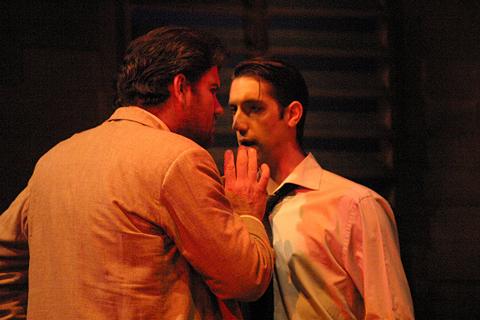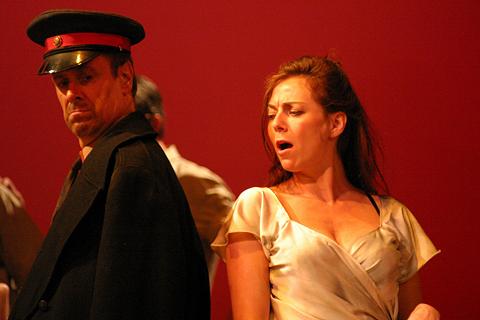|
<< -- 4 -- Roderic Dunnett A SUREFIRE HIT

Alex Grove is a rising talent: a young singer well worth casting directors looking out for. Also ex-Royal Northern College -- what a breeding ground Manchester is -- he sang Peter Quint for them, chillingly enough, and a confident Chekalinsky during the all-male build-up in their celebrated The Queen of Spades (starring the future Royal Opera House Vilar Artist, Hubert Francis).
Grove made a particularly vivid impact as Clonter Opera's Eisenstein (Die Fledermaus) last season: he has quite a gift for keeping a show moving. The voice is an interesting one (jury still out); but he's emerging, and sounded pretty impressive here as a fairly gangsterish El Remendado. More importantly, he's a presence : the brisk arrival at Lillas Pastia's, the unpleasantly mock-courteous 'Mon cher Monsieur' (to Escamillo), the almost cynically functional coating-up of the two lead robbers ('terrorists'?) and chorus in preparation for departure to the mountains, and the threatening, collar-up, gaunt figure of Remendado at rear on guard set against an almost Caspar David Friedrich landscape, all contributed to the subliminal sense of danger and threat, so integral an ingredient in good productions of this fateful opera. With his sharp features and dark brow, Grove can do threat rather well. He, too, may be a future Hermann; and in due course, if not cosy and lyrical enough for Britten's Essex -- a future Aschenbach, surely -- or even a tormented Captain Vere.

Dancairo (Robert Williams, left) instructs Remendado (Alex Grove, right). Photo © 2004 John Credland
|
There was a lot of variety in Gwion Thomas's Zuniga, too: ruling the roost over Martin Quinn's Morales and José as well, he arrives swaggering, casually arrogant, cigarette variously adroop and cap aslope, plus the ominous twin belts askew -- making him look as likely to have chosen Tupamaro guerilla as a job as Spanish policeman. At one point Thomas seemed almost as isolated as Fontane's Carmen -- with all twelve men onstage chirruping except Zuniga. He is hooked by Carmen's mock gift of an all-too red rose. His nasty leer suggests he is longing to slip one of those belts off his waist and round her neck like a halter -- which he duly does. When José slips the key down her cleavage, Zuniga notices: a nasty sexual obsession grows, which he takes out later by needlessly kneeing the arrested José in the groin: gratuitous everything.

Zuniga (Gwion Thomas) is allured by Yvonne Fontaine's Carmen. Photo © 2004 John Credland
|
By Act II at Lillas Pastia's Zuniga has become almost everyone's moll, blind drunk, enjoying the ribaldry, almost idolising Paul Carey Jones's Escamillo, and ultimately as sensual as a woman waiting to be kissed. His intervention 'Le bel officier' becomes all the more ironic; and his demise is nasty too.
Thomas has made a speciality of contemporary opera as well as mainstream -- Birtwistle (Mr Punch), Philip Glass, Nicola Lefanu, Steven Osborne's The Electrification of the Soviet Union, Sally Beamish's Monster -- working extensively with go-ahead companies like Music Theatre Wales, Dublin's equally pioneering Opera Theatre Company, Norway's Opera Vest and Musiek Theater Transparent, the Antwerp-based company which recently premièred the Peter Maxwell Davies/David Pountney Mr Emmet Changes Trains. For that impressive Belgian company Thomas recently sang the role of Janácek in a dramatisation of the Czech composer's relationship with Kamila Stosslová, called Intimate Letters.
Continue >>
Copyright © 3 October 2004
Roderic Dunnett, Mirfield, Yorkshire, UK

|

